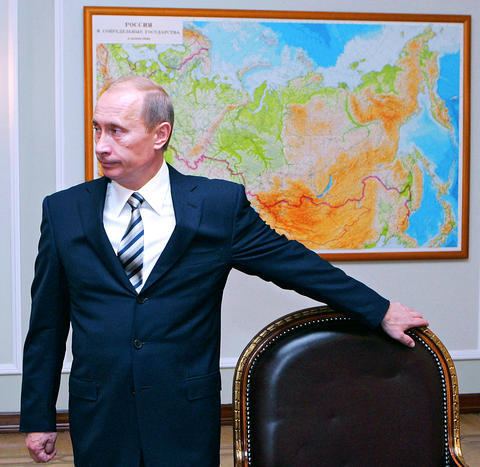Russia will set the date for presidential elections before the end of the month, the president of the upper house of parliament Sergei Mironov said in an interview with the newspaper Kommersant published yesterday.
"In line with the Russian constitution the Council of the Federation will set the date of the presidential election on Nov. 26," he said.
The paper said the vote would probably be held on March 2. The campaign for the presidential poll will start five days after the publication of the council's decision.

PHOTO: AP
Under the Constitution, Russian President Vladimir Putin cannot stand for a third term when his current term ends early next year.
Mironov said there was "no legal base to extend Vladimir Putin's powers. It is very late to change the Constitution," he added.
Putin announced on Oct. 1 that he would run for parliament in December heading the United Russia list and have a "realistic" shot at becoming prime minister, dropping a political bombshell that many thought could herald a fundamental change in the way Russia is governed.
Mironov said a victory of the United Russia party in the Dec. 2 elections to the State Duma "will give Vladimir Putin a moral right to take a more active part in domestic politics or to influence in a certain way foreign politics."
Putin has repeatedly said he will not change the Constitution for his own purposes, but insists that he will continue to be useful to the Russian people without saying how.
The Organization for Security and Cooperation in Europe announced Friday that it would send a skeleton crew of observers to cover Russia's December parliamentary elections, after Moscow said it would allow only 70 observers, compared with the 400 sent for parliamentary elections in 2003, said the organization's office responsible for monitoring elections.

‘UNUSUAL EVENT’: The Australian defense minister said that the Chinese navy task group was entitled to be where it was, but Australia would be watching it closely The Australian and New Zealand militaries were monitoring three Chinese warships moving unusually far south along Australia’s east coast on an unknown mission, officials said yesterday. The Australian government a week ago said that the warships had traveled through Southeast Asia and the Coral Sea, and were approaching northeast Australia. Australian Minister for Defence Richard Marles yesterday said that the Chinese ships — the Hengyang naval frigate, the Zunyi cruiser and the Weishanhu replenishment vessel — were “off the east coast of Australia.” Defense officials did not respond to a request for comment on a Financial Times report that the task group from

Asian perspectives of the US have shifted from a country once perceived as a force of “moral legitimacy” to something akin to “a landlord seeking rent,” Singaporean Minister for Defence Ng Eng Hen (黃永宏) said on the sidelines of an international security meeting. Ng said in a round-table discussion at the Munich Security Conference in Germany that assumptions undertaken in the years after the end of World War II have fundamentally changed. One example is that from the time of former US president John F. Kennedy’s inaugural address more than 60 years ago, the image of the US was of a country

DEFENSE UPHEAVAL: Trump was also to remove the first woman to lead a military service, as well as the judge advocates general for the army, navy and air force US President Donald Trump on Friday fired the chairman of the Joint Chiefs of Staff, Air Force General C.Q. Brown, and pushed out five other admirals and generals in an unprecedented shake-up of US military leadership. Trump wrote in a post on Truth Social that he would nominate former lieutenant general Dan “Razin” Caine to succeed Brown, breaking with tradition by pulling someone out of retirement for the first time to become the top military officer. The president would also replace the head of the US Navy, a position held by Admiral Lisa Franchetti, the first woman to lead a military service,

BLIND COST CUTTING: A DOGE push to lay off 2,000 energy department workers resulted in hundreds of staff at a nuclear security agency being fired — then ‘unfired’ US President Donald Trump’s administration has halted the firings of hundreds of federal employees who were tasked with working on the nation’s nuclear weapons programs, in an about-face that has left workers confused and experts cautioning that the Department of Government Efficiency’s (DOGE’s) blind cost cutting would put communities at risk. Three US officials who spoke to The Associated Press said up to 350 employees at the National Nuclear Security Administration (NNSA) were abruptly laid off late on Thursday, with some losing access to e-mail before they’d learned they were fired, only to try to enter their offices on Friday morning